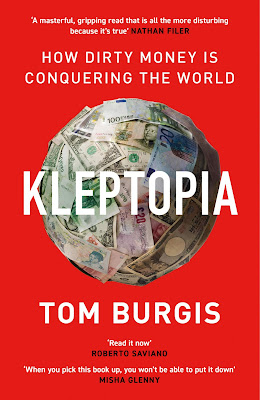(13. - 1128.) Kleptopia by Tom Burgis - We all know money flows swiftly around the world. We all know a significant amount of that flowing money comes from corrupt practices. We all know that most of that money stops flowing when it is laundered into Western world currencies.
What I did not know is how the money flows nor did I know the staggering quantity of corrupt money nor did I know how it is washed clean.
Burgis provides the details of what we all know and what I did not know in a brilliant narrative on world corruption.
Kazakhstan provides the foundation for the story. Its dictator, President Nursultan Kazarbayev, took charge of the nation after the breakup of the USSR. Blessed with oil and other natural resources he has bestowed great wealth upon selected colleagues and family members and himself.
At the heart of the book are “the Trio” - Alexander “Sasha” Machkevitch from Kyrgyzstan, Patokh Chokiev from Uzbekistan and Alijan Ibragimov of Uihghur descent.
Led by the Trio the money gravitates West. Most goes to London though the United States is also favoured. Connections are made in Africa and other nations.
A significant portion of the book covers the travails of Mukhtar Ablyazov. He was a Kazak businessman who owned one of Kazakhstan’s largest banks until he made the decision to oppose Kazarbayev. Within a short time Ablyazov flees to England seeking asylum while the Kazk government pursues him and his wealth.
Burgis shows how cleverly Kazarbayev uses the subservient Kazak legal system to declare a criminal an oligarch who betrays him by trying to threaten his leadership. With willing English lawyers he then leverages the English legal system to grant judgments against the erring oligarch.
In Africa, Rober Mugabe, having bankrupted Zimbabwe uses an investment of $100 million to buy a final election that keeps him in power until he is forced from office in 2017.
Even in countries, such as Canada, where we believe it is difficult to invest corrupt money, the tentacles of Eastern Europe oligarchs reach into the nation. Alex Shnaider has become a billionaire. Burgis outlines how Shnaider's connections to his father-in-law, Boris Birstein, who was deeply connected to the Kremlin and the Ukraine for decades, let him and a partner purchase a Ukrainian steel mill for $70 million, a fraction of its worth. When Shnaider and his partner decided, about 10 years later to sell, they were forced to sell to Russian interests chosen by the Kremlin for $850 million. (From the purchase price $50 million went as a break fee to another buyer, $10 million to the partners and $100 million as “commission” to an unnamed party or parties.) Shnaider shifted enough money to Canada to invest heavily in Canadian real estate including the Trump Tower that used to be in Toronto.
What I did not see was mention of Canadian banks.
Swiss banks, despite agreements with the U.S. and other countries to prevent tax fraud, remain very active in the movement of international money.
I was surprised by how eager Conservtive and Labour politicians in England were to embrace the Trio and their “comrades”.
I learned the perils of modern black money. Between Western governments constantly investigating and rapacious unreliable colleagues there is constant personal danger. Best to spend the loot.
While the aging oligarchs are transferring money to family members it is not clear whether the connections of the fathers will be beneficial to the next generation.
Sometimes, journalists try to tell a long story by strung together self-contained articles. Burgis avoids that approach. He is a skilled and convincing storyteller. I am confident numerous oligarchs slept less comfortably after Kletopia’s publication. My next position will be about an oligarchial reaction to the book.

This sounds like a sobering look at the way money finds its way around the world, Bill. Sometimes even if a country has laws against certain transactions, etc., things still happen. And it's an interesting way to see how people with that much money manage to hold into it (and get more). I'll be interested in your next post.
ReplyDeleteMargot: Thanks for the comment. Big money finds a way to move. It will be interesting to see what happens with the invasion of the Ukraine and the sanctions on Russian oligarchs and increasingly their families.
DeleteGlad that you enjoyed the book! I’ll have to borrow it the next time I’m in Melfort.
ReplyDeleteIt will be on your night table
Delete